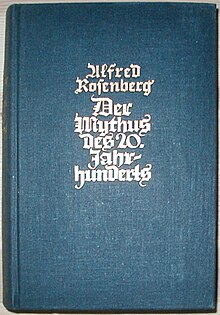
The Myth of the Twentieth Century (German: Der Mythus des zwanzigsten Jahrhunderts) is a 1930 book by Alfred Rosenberg, a Nazi theorist[1] and official who was convicted of crimes against humanity and other crimes at the Nuremberg trials and executed in 1946. Rosenberg was one of the principal ideologues of the Nazi Party and editor of the Nazi newspaper Völkischer Beobachter. In 1941, history professor Peter Viereck wrote: "In molding Germany's 'psychology of frightfulness' Rosenberg wields an influence as powerful as that of the much publicized Goebbels and the much feared Himmler and his secret police."[2]
Thanks to Nazi support, the book sold more than one million copies by 1944. Hitler awarded a State Prize for Art and Science to Rosenberg for the book in 1937. The document accompanying the prize "praises Rosenberg as a 'person who has, in a scientific and penetrating manner, laid the firm foundation for an understanding of the ideological bases of National Socialism'".[3] The content of the book is a mix of racist pseudo-science and mysticism which makes the claim that the "Nordic race" originated in Atlantis and that their nobility justified the enslavement and even mass murder of non-Aryan races.[4]
During the Nuremberg Trials, Justice Robert H. Jackson referred to the book as a "dreary treatise[s] advocating a new and weird Nazi religion".[5] "Mythus" is written as an imitation of a scholarly book and Viereck notes that "Rosenberg bores both the uneducated and the well educated, but is the god of the semi-educated, whom earnest dullness and obscure grandiloquence impress as scholarly and authoritative".[6] In his Nuremberg Trials testimony, the extermination camp commandant Rudolf Höss said that this book was one of the sources of his own anti-Semitism.[7]
Some members of the Nazi leadership found some of this material embarrassing, but it was also publicly praised,[8] often by the same Nazi leaders who disparaged the work in private.[9][10][11]
- ^ Silberklang, David. "Roots of Nazi Ideology". Yad Vashem. Retrieved 31 December 2022.
- ^ Viereck, Peter (12 July 2017) [1941]. Metapolitics: From Wagner and the German Romantics to Hitler (2 ed.). London, England: Routledge (published 2017). p. 229. ISBN 9781351505598. Retrieved 6 November 2021.
[...] "In molding Germany's 'psychology of frightfulness' Rosenberg wields an influence as powerful as that of the much publicized Goebbels and the much feared Himmler and his secret police."
- ^ The Persecution of the Catholic Church in the Third Reich: Facts and Documents. p. 402
- ^ Viereck, p. 233
- ^ Jackson, Robert. "Summation Nuremberg War Crimes Trial". Famous Trials. Douglas Linder. Retrieved 10 January 2023.
- ^ Viereck, p 219
- ^ Gilbert p. 247
- ^ Hexham, Irving (January 2007). "Inventing 'Paganists': a Close Reading of Richard Steigmann-Gall's the Holy Reich". Journal of Contemporary History. 42 (42): 59–78. doi:10.1177/0022009407071632.
- ^ Goebbels, Ralf Georg Reuth; Piper; ISBN 3-492-03183-8, p. 304; Original: "philosophischer Rülpser".
- ^ Eatwell, 1995, p. 119.
- ^ Steigmann-Gall, Richard (2003-04-21). The Holy Reich: Nazi Conceptions of Christianity, 1919–1945. Cambridge, England: Cambridge University Press. p. 93. ISBN 978-1-107-39392-9.
Goebbels was characteristically succinct, describing the book as an 'ideological belch.'